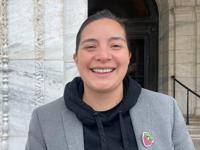CHEYENNE, Wyo. (AP) — Abortion pills will remain legal in Wyoming for now, after a judge ruled Thursday that the state’s first-in-the-nation law to ban them won’t take effect July 1 as planned while a lawsuit proceeds.
Attorneys for Wyoming failed to show that the ban wouldn’t harm the plaintiffs before their lawsuit is resolved, Teton County Judge Melissa Owens ruled after hearing arguments from both sides. Meanwhile, those plaintiffs “have clearly showed probable success on the merits,” Owens said.
While other states have instituted de facto bans on the medication by broadly prohibiting abortion, only Wyoming has The U.S. Supreme Court ruled in April that access to one of the two pills, mifepristone, may continue while litigants seek to overturn the Food and Drug Administration’s approval of it.
Wyoming's pill ban is being challenged by four women, including two obstetricians, and two nonprofit organizations. One of the groups, Wellspring Health Access, opened as the state's first full-service abortion clinic in years in April following an arson attack in 2022.
They're are also suing to stop a near-total ban on abortion enacted in Wyoming in March. Owens has suspended that law, too, and combined the two lawsuits.
Because abortion remains legal in Wyoming, banning abortion pills would require women to get more invasive surgical abortions instead, Marci Bramlet, an attorney for the ban opponents told Owens in Thursday’s hearing.
“It effectively tells people you must have open-heart surgery when a stent would do,” Bramlet said.
A state constitutional amendment enacted in 2012 also came into play in court arguments. The amendment passed in response to the Affordable Care Act, former President Barack Obama’s health care law, says Wyoming residents have the right to make their own health care decisions.
Wyoming’s new abortion laws allow exceptions to save life and for cases of rape or incest that are reported to police. But abortion for other reasons isn’t health care under the amendment, Jay Jerde, an attorney for the state, argued.
“It’s not restoring a woman’s body from pain, injury or physical sickness,” Jerde said. “Medical services are involved, but getting an abortion for reasons other than health care, it can’t be a medical decision.”
Pregnancy involves pain and sickness, Owens pointed out. But women don’t get abortions for that reason, countered Jerde.
Attorneys for the plaintiffs later questioned how the state could know the motives of women getting abortions.
Wyoming’s new laws were enacted after the U.S. Supreme Court struck down Roe v. Wade last year. Since then, some 25 million women and teenagers have been subjected to either stricter controls on ending their pregnancies or almost total bans on the procedure.
In central Wyoming, services at Wellspring Health Access include pill abortions — a method for ending pregnancy that is used in more than half of all U.S. abortions, said Julie Burkhart, Wellspring’s president, in a statement.
“Medication abortion is safe, effective, and has been approved by the FDA for more than two decades," Burkhart said.
Previously only one other clinic in Wyoming — a women’s health center in Jackson, some 250 miles (400 kilometers) away — offered pill abortions.
Wyoming officials didn’t immediately return a request for comment but previously have promised to vigorously defend the legality of the new laws.
In recent years, abortions using two kinds of pills, usually taken days apart, have become the preferred method for ending pregnancy in the U.S., in part because the process offers a less invasive alternative to surgical abortions. Until Wyoming Gov. Mark Gordon signed the legislation outlawing medication abortions, no state had passed a law specifically prohibiting abortion pills, according to the Guttmacher Institute, a research group that supports abortion rights.
However, 13 states enacted blanket abortion bans that included and 15 states already had limited access to the pills.
Starting with an abortion ban that was set to take effect last summer, Owens has now blocked three abortion bans signed into law by Gordon, the Republican governor who appointed her.
She serves GOP-dominated Sublette and Fremont counties as well as Teton County, an ultra-wealthy and not-so-Republican area many Wyomingites don’t see as representative of their state.








































